Apple officially acquired NeXT 23 years ago, changing everything
Most college students today have only known Apple as the fashionable, popular, commercially competent, and trend setting global technology giant it is today. However, 23 years ago Apple Computer, Inc. was struggling to survive while trying to sell Macs in a PC world centered around Microsoft Windows. Things began to change after Apple acquired NeXT in a surprise deal that was announced in the last week of 1996 and was completed on February 7, 1997.
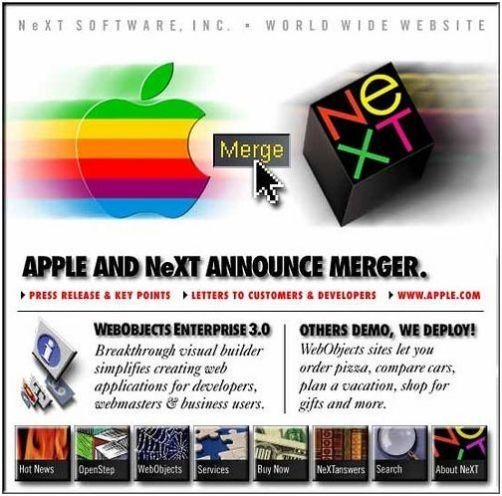
NeXT referred to its acquisition as a "merger"
More importantly, however, the infusion of new management from NeXT served to clear out the unfocused fiefdoms at Apple that each sought to promote their own pet projects, often at the expense of other parts of the company. Bad management and an increasingly dysfunctional corporate culture had caused Apple to crumble from its Golden Age of the late 1980s into an increasingly irrelevant collection of teams, collectively coasting along on past successes while looking for other companies to adopt and build its platforms.
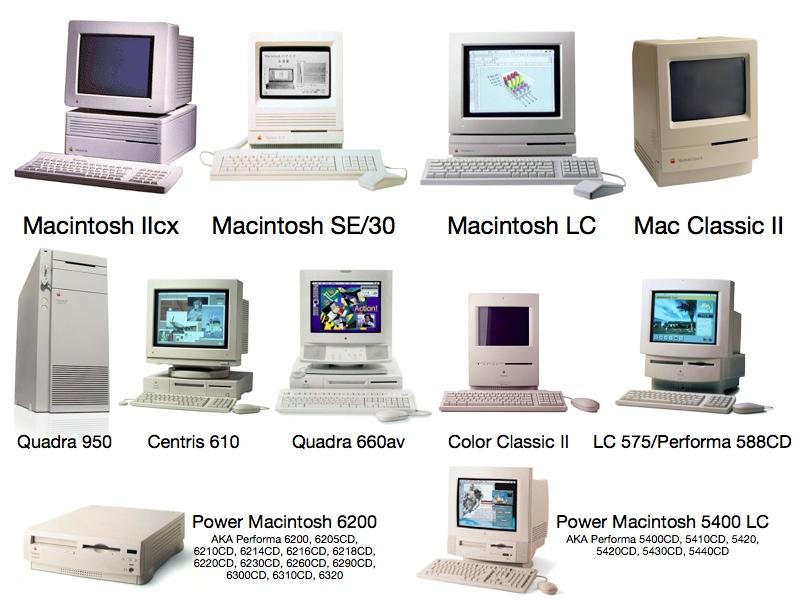
Apple's Golden Age began to lose its luster as iconic product models expanded into mess of dull SKUs
Rather than aggressively inventing the future, the Apple of the mid 1990s was seeking to develop openly licensed software that other PC and device makers could license. It began licensing both its classic Mac OS and the new Newton OS developed to power handheld "PDA" tablet devices.
Both strategies weakened Apple's ability to deliver great products and deploy important technologies itself. Instead, these licensing deals made Apple dependent upon the whims and cost cutting conservatism of various hardware partners, much like Google's Android has over the past decade.
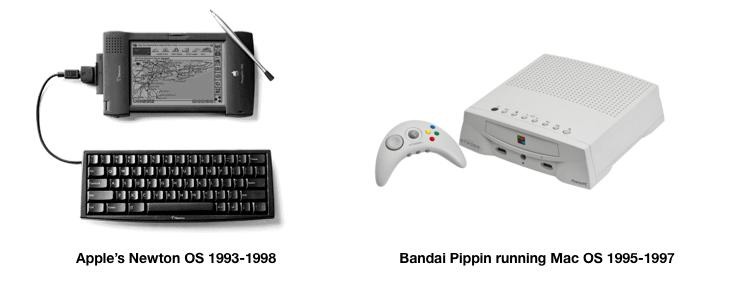
Newton and Pippin, harbingers of today's broadly licensed platforms
The acquisition of NeXT also famously brought Steve Jobs back to the company he had cofounded twenty years earlier. Jobs initially seemed content with playing an advisory role. But rather than selling off the stock he gained in the deal and leaving to start something new, Jobs began assembling a competent management team with the goal of turning Apple around.
Part of that included leveraging Apple's remaining core customers and valuable technologies, but it notably also included boldly saying no to a series of initiatives and strategies that were not working-- including OS licensing and a series of internal initiatives and projects that showed limited prospects of commercial success or popular adoption.
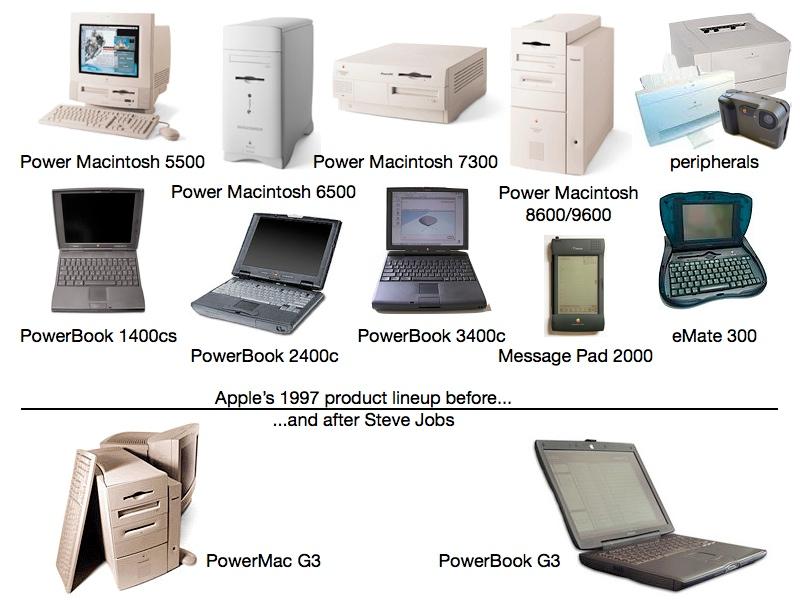
Steve Jobs dramatically simplified Apple's offerings in 1997
It took less than a year for Apple to lay out a clear product strategy for its future. It took several more years to fully implement this strategy centered around a modernization of the Mac system software, which Apple eventually branded as "Mac OS X." To most people, it did not appear likely that Apple could find enough interest in Macs to ever turn the company around. However, Apple's new management team focused its efforts on a wider market of emerging trends, particularly involving mobility, music, photos, and digital video.
Many of Apple's critics insisted that the company should build Macs running Windows NT, effectively becoming another low-value commodity PC maker. Instead, Jobs recruited Tim Cook, then an operations manager at Compaq, and put him in charge of modernizing Apple's global operations, enabling Apple to sell its own hardware in a sustainable profitable way while continuing to develop its own software and development tools to differentiate Macs from generic PCs.
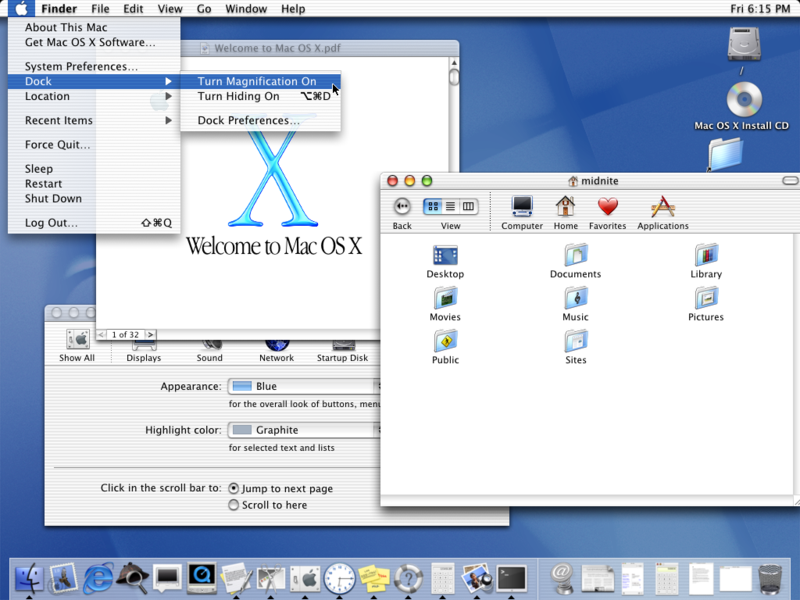
Leveraging NeXT technology, Mac OS X powered and differentiated Apple's new Mac hardware
The timing was perfect. The global monoculture of licensed Windows PCs was brewing up a storm of malware and virus outbreaks that halted Microsoft's progress just as Mac OS X began to arrive as a product. With Microsoft focused on putting out the fires of Windows XP, Apple could focus attention on its eye catching designs and its easy to use operating system with no real need for constant virus scanning.
Apple also embarked upon building its own Safari web browser, developed under an open source WebKit program that would eventually shift the balance of power on the web from Microsoft's Internet Explorer to open source. Following the same development strategy underlying the open development of NeXTSTEP's BSD Unix core, WebKit became the world's most popular web browser engine and the only significant browser among mobile devices until Google forked WebKit to deliver Chrome.
Apple also began plans to completely replace the GNU Compiler Collection development toolchain of GNU/Linux (shared with Mac OS X) with an advanced new LLVM compiler architecture under development at the University of Illinois at Urbana-Champaign, also offered under under a BSD style open source license. Apple added LLDB and Clang to the mix, dramatically shifting how the future of Unix-like software would be written.
Additionally, Apple cracked open the highly proprietary worlds of audio streaming, video encoding and distribution by supporting MP3, AAC, and MPEG H.264, defeating plans by Sony and Microsoft to replace open audio playback with proprietary standards intended to lock down music. Similar efforts to control video playback streaming on the Internet by Adobe's Flash were dashed when Apple leveraged all of its market power to break the back of Flash, opening video to everyone.
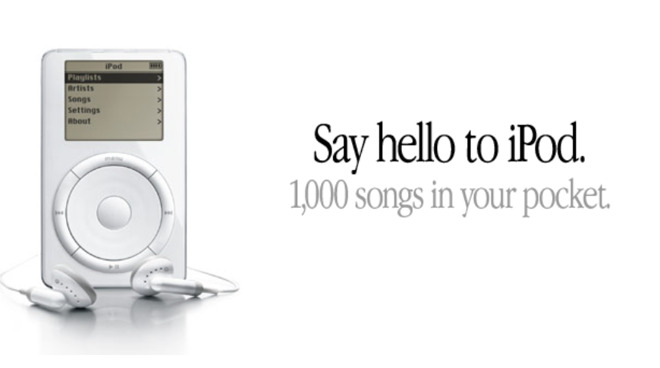
Like the Mac, iPod bucked PC convention by delivering premium tech, rather than a cheap price tag
Rather than aiming to be as cheap as possible, iPod aimed at superior enough to justify its price. That was the same Jobsian strategy that had created the original Macintosh, had launched NeXT, and had put Apple back into the game with the 1998 iMac. A few years later, Apple took everything it had learned from selling generations of tens of millions of iPod-- from operations to product management to apps and software development tools-- and applied them to release iPhone.
Critics again insisted that Apple could have just released a Symbian phone with a unique UI layer, but Apple was able to take its own advanced software and scale it down to work on less powerful, mobile hardware, in part because it had been focused on doing this for its Mac notebooks. Moving its NeXT-derived software from Macs to iOS also meant that developing new iPhone apps would be familiar to existing Mac developers.
Microsoft had already conclusively proven that putting "the full Windows" on scaled down hardware resulted in a confusing, complex, slow and expensive series of products that nobody wanted to buy. Rather than failing in tablets the same way, Apple differentiated its tablet and Mac offerings and rapidly became the world's largest computing vendor.
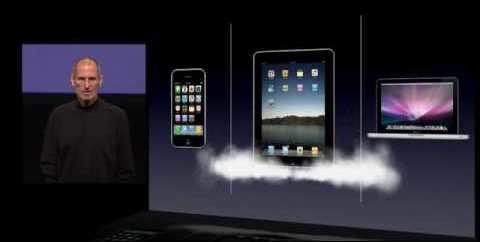
Steve Jobs announced iPad as a new category, not a mobile Mac
A year after the launch of iPad, Apple lost its founder. Without Jobs, the company was expected to drift off out of relevancy. Instead, Jobs' executive team focused on how to deliver great products for the future.
Over the past decade, Apple has radically refined its macOS software and scaled iOS up into the more powerful iPadOS, down into the wearable watchOS, and branched out into home products with tvOS and HomePod. It has delivered a series of initiatives related to health, research, sports, and accessibility, while increasingly modernizing everything from the user experience of cars to the automation of home devices, the way we listen to music, and most recently even created a solid presence in original entertainment content with Apple TV+.
Rather than seeking to buy up entire industries, Apple's comment on acquisitions states that it "buys smaller companies from time to time," and that "we generally don't discuss our purpose or plans." That's because Apple's acquisitions are part of overall plans to competently develop new products and services as efficiently as possible. Sometimes that involves buying a technology (as with AuthenTec) and sometimes it involves buying a team or facilities. After Apple acquired PA Semi in 2008, it radically shifted its focus from developing low power PowerPC processors to building mobile chips capable of powering iPhones and iPad.
That's particularly noteworthy in a business climate where large, celebrated acquisitions often fail. Google spent $15 billion to buy up Motorola and Nest, and Microsoft spent a similar amount to buy Nokia and aQuantive, with none of those massive deals resulting in a successful new business. Most of Apple's acquisitions have typically been less than it paid for NeXT-- at only just over $400 million, it was perhaps one of the best deals ever made.

NeXT referred to its acquisition as a "merger"
Jobs, jobs and a lot of work
Apple's acquisition of NeXT Software 23 years ago most obviously provided the company with a modern operating system foundation. NeXT's advanced software and development tools promised to replace the old Mac System Software that had debuted back in 1984. The "classic" Mac software platform had grown outdated and difficult to modernize without breaking the software that ran on it.More importantly, however, the infusion of new management from NeXT served to clear out the unfocused fiefdoms at Apple that each sought to promote their own pet projects, often at the expense of other parts of the company. Bad management and an increasingly dysfunctional corporate culture had caused Apple to crumble from its Golden Age of the late 1980s into an increasingly irrelevant collection of teams, collectively coasting along on past successes while looking for other companies to adopt and build its platforms.

Apple's Golden Age began to lose its luster as iconic product models expanded into mess of dull SKUs
Rather than aggressively inventing the future, the Apple of the mid 1990s was seeking to develop openly licensed software that other PC and device makers could license. It began licensing both its classic Mac OS and the new Newton OS developed to power handheld "PDA" tablet devices.
Both strategies weakened Apple's ability to deliver great products and deploy important technologies itself. Instead, these licensing deals made Apple dependent upon the whims and cost cutting conservatism of various hardware partners, much like Google's Android has over the past decade.

Newton and Pippin, harbingers of today's broadly licensed platforms
The acquisition of NeXT also famously brought Steve Jobs back to the company he had cofounded twenty years earlier. Jobs initially seemed content with playing an advisory role. But rather than selling off the stock he gained in the deal and leaving to start something new, Jobs began assembling a competent management team with the goal of turning Apple around.
Part of that included leveraging Apple's remaining core customers and valuable technologies, but it notably also included boldly saying no to a series of initiatives and strategies that were not working-- including OS licensing and a series of internal initiatives and projects that showed limited prospects of commercial success or popular adoption.

Steve Jobs dramatically simplified Apple's offerings in 1997
It took less than a year for Apple to lay out a clear product strategy for its future. It took several more years to fully implement this strategy centered around a modernization of the Mac system software, which Apple eventually branded as "Mac OS X." To most people, it did not appear likely that Apple could find enough interest in Macs to ever turn the company around. However, Apple's new management team focused its efforts on a wider market of emerging trends, particularly involving mobility, music, photos, and digital video.
Many of Apple's critics insisted that the company should build Macs running Windows NT, effectively becoming another low-value commodity PC maker. Instead, Jobs recruited Tim Cook, then an operations manager at Compaq, and put him in charge of modernizing Apple's global operations, enabling Apple to sell its own hardware in a sustainable profitable way while continuing to develop its own software and development tools to differentiate Macs from generic PCs.

Leveraging NeXT technology, Mac OS X powered and differentiated Apple's new Mac hardware
The timing was perfect. The global monoculture of licensed Windows PCs was brewing up a storm of malware and virus outbreaks that halted Microsoft's progress just as Mac OS X began to arrive as a product. With Microsoft focused on putting out the fires of Windows XP, Apple could focus attention on its eye catching designs and its easy to use operating system with no real need for constant virus scanning.
NeXT cracks Apple open
In addition to its continued work in developing proprietary software, Apple's NeXT-derived development team announced plans to make the core Unix OS foundation of Mac OS X an open source project named Darwin. Along with Apple's own open code, the company began funding open development of existing and emerging projects, ranging from an adoption of open specifications such as OpenGL (in place of Apple's proprietary QuickDraw 3D) to the purchase of and continued maintenance of CUPS, the open printing architecture used by Mac OS X and other free Unix and Linux distributions.Apple also embarked upon building its own Safari web browser, developed under an open source WebKit program that would eventually shift the balance of power on the web from Microsoft's Internet Explorer to open source. Following the same development strategy underlying the open development of NeXTSTEP's BSD Unix core, WebKit became the world's most popular web browser engine and the only significant browser among mobile devices until Google forked WebKit to deliver Chrome.
Apple also began plans to completely replace the GNU Compiler Collection development toolchain of GNU/Linux (shared with Mac OS X) with an advanced new LLVM compiler architecture under development at the University of Illinois at Urbana-Champaign, also offered under under a BSD style open source license. Apple added LLDB and Clang to the mix, dramatically shifting how the future of Unix-like software would be written.
Additionally, Apple cracked open the highly proprietary worlds of audio streaming, video encoding and distribution by supporting MP3, AAC, and MPEG H.264, defeating plans by Sony and Microsoft to replace open audio playback with proprietary standards intended to lock down music. Similar efforts to control video playback streaming on the Internet by Adobe's Flash were dashed when Apple leveraged all of its market power to break the back of Flash, opening video to everyone.
What's NeXT after Mac
Apple didn't just contentedly crank out Macs. Instead, it focused on software to drive new tasks and sell more hardware to new users. One of its first acquisitions became iTunes, a product that not only made Macs popular among music lovers, but also created the opportunity in 2001 for selling iPod as an easy way to take thousands of songs with you at a time when most music players were limited to a single CD or mixtape, or a few MB of Flash RAM. Apple sold iPod at a premium price tier that introduced affordable luxury in technology.
Like the Mac, iPod bucked PC convention by delivering premium tech, rather than a cheap price tag
Rather than aiming to be as cheap as possible, iPod aimed at superior enough to justify its price. That was the same Jobsian strategy that had created the original Macintosh, had launched NeXT, and had put Apple back into the game with the 1998 iMac. A few years later, Apple took everything it had learned from selling generations of tens of millions of iPod-- from operations to product management to apps and software development tools-- and applied them to release iPhone.
Critics again insisted that Apple could have just released a Symbian phone with a unique UI layer, but Apple was able to take its own advanced software and scale it down to work on less powerful, mobile hardware, in part because it had been focused on doing this for its Mac notebooks. Moving its NeXT-derived software from Macs to iOS also meant that developing new iPhone apps would be familiar to existing Mac developers.
The NeXT Tablet
A few years later in 2010, Apple released iPad, which brought the same scaled down iOS environment to a handheld slate to deliver very mobile, very efficient, very simple mobile computing to vast new audiences of buyers. Again, critics demanded that Apple should have instead put the old Mac OS on a lighter, thinner, tablet or netbook, but that would have only delivered a worse, more expansive Mac.Microsoft had already conclusively proven that putting "the full Windows" on scaled down hardware resulted in a confusing, complex, slow and expensive series of products that nobody wanted to buy. Rather than failing in tablets the same way, Apple differentiated its tablet and Mac offerings and rapidly became the world's largest computing vendor.

Steve Jobs announced iPad as a new category, not a mobile Mac
A year after the launch of iPad, Apple lost its founder. Without Jobs, the company was expected to drift off out of relevancy. Instead, Jobs' executive team focused on how to deliver great products for the future.
Over the past decade, Apple has radically refined its macOS software and scaled iOS up into the more powerful iPadOS, down into the wearable watchOS, and branched out into home products with tvOS and HomePod. It has delivered a series of initiatives related to health, research, sports, and accessibility, while increasingly modernizing everything from the user experience of cars to the automation of home devices, the way we listen to music, and most recently even created a solid presence in original entertainment content with Apple TV+.
Apple's next NeXTs
In the same way that Jobs' NeXT built its own development frameworks and operating environment, Apple has built its own technology for iMessages, for Siri, Maps, for new technologies such as Augmented Reality and computational photography. But Apple has also replicated its own success in acquiring NeXT in the strategic purchase of promising companies. That includes AuthenTec for Touch ID; PrimeSense for Face ID; and Beats for Apple Music and a portfolio of audio accessories-- to name just a few of its dozens of Apple's recent acquisitions.Rather than seeking to buy up entire industries, Apple's comment on acquisitions states that it "buys smaller companies from time to time," and that "we generally don't discuss our purpose or plans." That's because Apple's acquisitions are part of overall plans to competently develop new products and services as efficiently as possible. Sometimes that involves buying a technology (as with AuthenTec) and sometimes it involves buying a team or facilities. After Apple acquired PA Semi in 2008, it radically shifted its focus from developing low power PowerPC processors to building mobile chips capable of powering iPhones and iPad.
That's particularly noteworthy in a business climate where large, celebrated acquisitions often fail. Google spent $15 billion to buy up Motorola and Nest, and Microsoft spent a similar amount to buy Nokia and aQuantive, with none of those massive deals resulting in a successful new business. Most of Apple's acquisitions have typically been less than it paid for NeXT-- at only just over $400 million, it was perhaps one of the best deals ever made.



Comments
Wrong. Everything that's successful for Apple these days is a direct result of NeXT technology. Without this solid, proven operating system, Apple would be in a very different place today. NeXT's hardware initiative may have failed, but their software lives on in macOS, iOS, tvOS and watchOS today.
In 1984 Apple released Macintosh. Huey Lewis release a song in 1986 "I Like things that don't change, the more something changes the more it stays the same" why do I mention that? Prior to Windows and Macintosh the only alternative to huge mainframes was UNIX. There is a lot of history surrounding the evolution of UNIX and unix derivatives (LINUX is not one of them) NeXT was based on Berkley Software Distribution Free BSD (Unix) As of 2020 Windows 10 is the only supported corporate workstation Operating System in the world that is not a Unix or Unix Like (Linux) Operating system. Apple's OS X is so similar to Linux in many respect that there are actually Linux Distros that appear and act much like OS X.
The point of all that was that as Huey Lewis mentioned in 1986 the more something changes (time, evolution) the more it stays the same (OS convergences on Unix/Unix Like OSes) The Brilliance of Steve Jobs was not a computer and not even technology really. It was his visionary approach to divining consumer demand and giving them what they want. The essence of Steve Jobs is displayed in a YouTube Clip where he is answering a former Open Doc developer who tells him in front of the world "you clearly don't know what you are talking about" The response is priceless, it is timeless, it is the quintessential Steve Jobs
Plus those sweet blue jeans.
Yeah this entire keynote was good, he laid out what they were going to do years in advance.